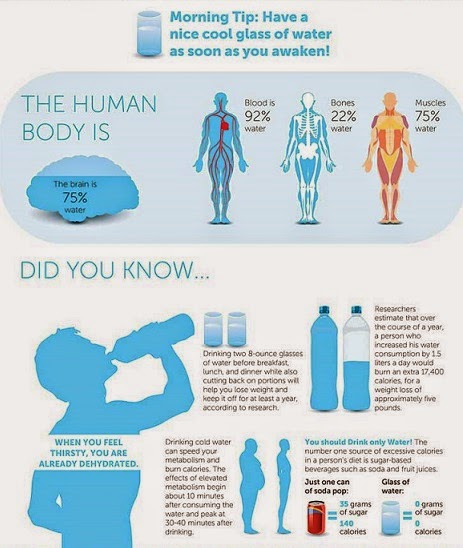

Water and Salt are Vital for Prevention and Early Correction of Neurological Disorders.
1. Human brain is 85% water encased in salt water.
2. Transport in nerves depends on freely flowing microstream waterways.
3. Dehydration is responsible for loss of essential amino acids and minerals ㅡ ultimately the cause of brain damage and nerve damage.
Fatigue. Water is the most vital sources of energy in the body. Dehydration causes the enzymatic activity in the body to slow down, resulting in tiredness and fatigue.
High blood pressure. The blood is normally about 92% water when the body is fully hydrated. When dehydrated, the blood becomes thicker causing resistance to blood flow and resulting in elevated blood pressure.
Asthma and allergies. When dehydrated, your body will restrict airways as a means to conserve water. In fact, the rate of histamine produced by the body increases exponentially as the body loses more and more water.
Skin disorders. Dehydration impairs the elimination of toxins through the skin and makes it more vulnerable to all types of skin disorders, including dermatitis and psoriasis, as well as premature wrinkling and discoloration.
High cholesterol. When the body is dehydrated, it will produce more cholesterol to prevent water loss from the cells.
Bladder and kidney problems. With a dehydrated body, the accumulation of toxin and acid waste create an environment where bacteria thrive ! Resulting in the bladder and kidney to be more prone to infection, inflammation and pain.
Digestive disorders. A shortage of water and alkaline minerals, such as calcium and magnesium , can lead to a number of digestive disorders, including ulcers, gastritis and acid reflux.
Constipation. When the body short of water, the colon is one of the primary regions the body draws water from in order in order to provide fluids for other critical functions. Without adequate water, wastes move through the large intestines much more slowly or sometimes not at all, resulting in constipation.
Joint pain or stiffness. All joints have cartilage padding which is composed mainly of water. When the body is dehydrate, cartilage is weakened and joint repair is slow resulting in pain and discomfort.
Weight gain. When the body is dehydrated, cells are depleted of energy which causes them to rely. As a result, people tend to eat more when , in reality, the body is thirsty.
Premature aging. When chronically dehydrated, the body's organs, including its largest organ , the skin, begins to wither prematurely.
The average human body is 75% water.
On average you should aim to drink 8 x 8-ounces glasses of water every day.
Factors that require increased water consumption include: exercise, environment, illness, pregnancy, breastfeeding.
The average adult loses about 10 cups of water everyday, simply by breathing, sweating, urinating and eliminating waste.
Morning Tip: Have a nice cool glass of water as soon as you awaken !
THE HUMAN BODY IS :
The brain is 75% water.
The blood is 92% water.
The bones are 22% water.
The muscles is 75% water.
DID YOU KNOW ... WHEN YOU FEEL THIRSTY, YOU ARE ALREADY DEHYDRATED.
Drinking 2 x 8-ounces glasses of water before breakfast, lunch, and dinner while also cutting back on food portions will help you gain ideal weight and keep extra weight off for at least a year, according to research.
Researchers estimate that over the course of a year, a person who increased his water consumption by 1.5 liters a day would burn an extra 17,400 calories, for a weight loss of approximately 5 pounds.

No comments:
Post a Comment